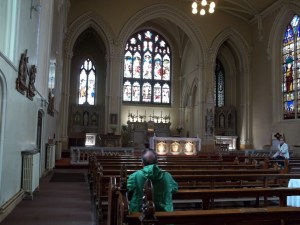In our first reading from the first book of Samuel, we hear of the Lord calling Samuel by name, while he is still a young boy, and the eventual response by this boy on the advice of his mentor Eli: ‘Speak Lord, for your servant is listening,” The reading goes on to say how as Samuel grew, the Lord was with him, and Samuel did not let a single word of the Lord, ‘fall to the ground.’ Samuel was faithful in doing everything that God asked him to do. God’s word and instruction would become more important to him than anything else – his reputation, his comfort, his own desires.
In our Gospel passage from St. John, we hear how John the Baptist points out Jesus to some of his own followers, identifying Jesus as ‘the Lamb of God’ – and two of these disciples follow after Jesus.
John has continued being faithful to his own call of setting the stage for Jesus, identifying Jesus for others, and then stepping back – without consideration for his own position or reputation; he had a substantial number of followers of his own, but John was faithful to his vocation. He was not the priority; preparing the way of the Lord, setting the stage or bringing others to Jesus – and then putting himself in the background – that was his priority.
Later in this same Gospel passage, Andrew brings his brother Simon to meet Jesus – again, someone who has come to know Jesus introduces another person to Jesus – and Jesus in his meeting with Simon changes his name to Peter or Kepha, which means ‘rock’ (in Matthew’s Gospel this is expanded on, with the words, ‘and upon this rock I will build my Church’).
Peter will no longer go back to being known only as Simon – with the change in name has come a fundamental change in his person; and although throughout the gospels we have example after example of how Peter is loyal to Christ, and other times how he fails Christ, ultimately he will show his faithfulness by giving his own life for his faith in Jesus.
Whether it is Samuel, or the Baptist, or Andrew or Peter, repeatedly we hear examples of those who respond to the invitation to come and know God in a more intimate way, a more personal way, surrendering their priorities, their ‘selves’ to that call from God to become more deeply involved with serving God and bringing others to know Him.
Each time we gather for the celebration of the Eucharist, we are responding to that call to come and know Christ more intimately. Each time we approach the altar to receive Jesus in the Blessed Sacrament we are responding to that call, and when we receive Him in Holy Communion, we take Him into ourselves – and if we really and truly believe that Jesus is present in this Sacrament, then we cannot help but be changed at some level of our being. It’s a question of how much awareness we have of that change.
It’s the same with all of the other Sacraments – baptism and confirmation; in reconciliation or anointing of the sick; in matrimony or in Holy Orders; the Church teaches and we believe that Christ is truly present in each of these Sacraments;, and when we enter into any of these Sacraments, we become more than we are on our own; we encounter Jesus in a very intimate way; we are fundamentally changed in our most interior selves.
But it’s a package deal – as Catholics, we don’t pick and choose which Sacrament Christ is present in and which one He is not; either we believe He’s present in all of them, or He’s present in none of them – it’s not a cafeteria. We can’t pick and choose which Sacraments Jesus, who is God, enters into our lives, and which ones He doesn’t.
The challenge then, for us, is to allow that interior change to affect our exterior selves; to bring the influence of Jesus and the love of God into our thoughts, our words and our actions in everything that we say and do. Certainly not so that we can win praise, or be noticed or honoured; rather so that we can be a reflection of Christ who has called each one of us by name; so that we can be like Andrew and introduce our brothers and sisters authentically to Jesus; so that we can be like the Baptist, and point others away from ourselves and towards Jesus; so that when we open ourselves to hear God’s will in our lives, we can each respond with Samuel,
“Speak Lord, your servant is listening.”
Praised be Jesus Christ, now and forever!


